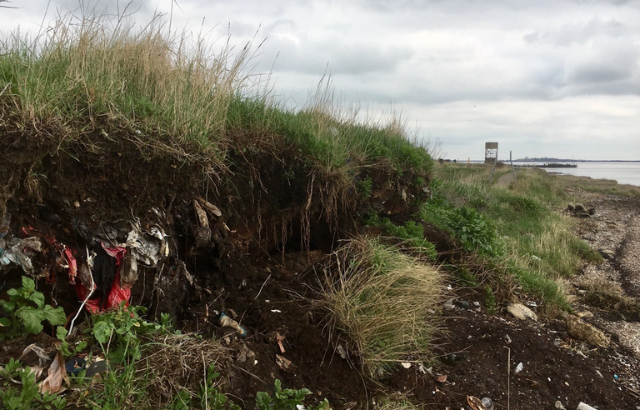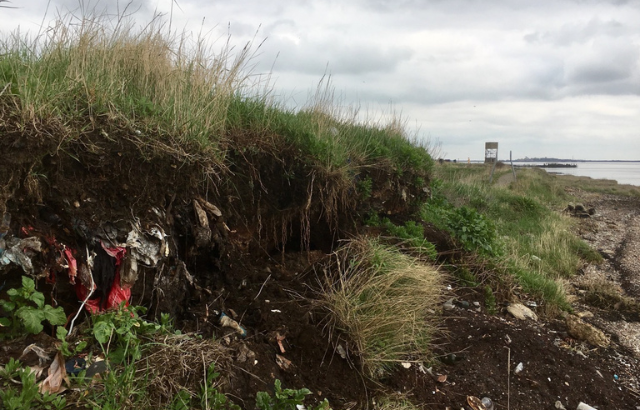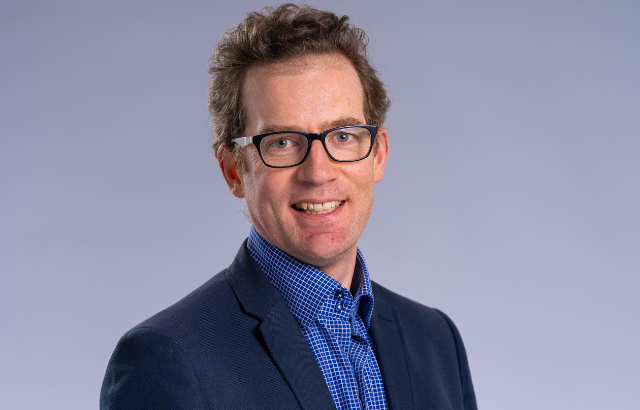£2.9 million funding awarded to research the impacts of historic landfill on UK coasts and communities
The Resilience of Anthropocene Coasts and Communities (RACC) project, led by Professor Kate Spencer and Dr Andy Russell from the School of Geography at Queen Mary University of London with Professor Larissa Naylor at the University of Glasgow, has been awarded £2.9 million as part of the broader UK Research and Innovation (UKRI) and Defra funded Resilient UK Coastal Communities and Seas programme.

This funds 5 large strategic projects, including projects led by teams at the University of Essex (ARISE) and the COAST-R Network Plus headed by Professor Briony McDonagh at the University of Hull, which will work to generate and share learning across sectors and disciplines to build UK coastal and marine resilience. The primary focus of the RACC project will be to assess the combined risks of climate change, coastal flooding and erosion, and the presence of thousands of historic landfills and contaminated sites across the UK’s coast.
The research conducted by RACC will assess the impacts of pollution release from historic coastal landfills, which can include heavy metals, persistent organic pollutants, medical waste, plastics, and asbestos, on coastal habitats and communities. The study will focus on three UK geographic areas, assessing the environmental and social challenges posed and developing a suite of sustainable management options in collaboration with stakeholders and communities.
"We currently have a poor understanding of the pollution these historic coastal landfills contain and what will happen to their waste contents with accelerating coastal flooding and erosion” says Professor Kate Spencer. "Our research will fill existing gaps in evidence and support coastal management decision-making while mitigating the impacts on affected coastal environments, communities and businesses."
Dr. Andy Russell added, "We are proud to lead this ground-breaking research initiative, which marks the first national effort to link the risks of climate change and waste release from historic coastal landfills, with a focus on understanding the impacts on coastal communities. We know that government progress in preparing for the impacts of climate change has been too slow and this project gives us the chance to influence future plans to ensure that we are ready for the climate challenges we face."
The RACC project brings together a consortium of leading academic institutions including the University of Glasgow, King's College London, the University of Sunderland, and Bradford University. Additionally, the project collaborates with key stakeholders such as the Environment Agency, the Scottish Environment Protection Agency, the Local Government Association, Natural England, NatureScot, the Museum of London Archaeology, and various coastal partnerships, businesses, and community groups.
Commenting on the announcement, project partners and key stakeholders of the project shared their support for this exciting and nationally important project:
Professor Larissa Naylor, University of Glasgow - “Policy makers and practitioners from the local to national level will benefit greatly from co-creating rigorous research into coastal communities and environments to plan for the future. This project hinges on combining rigorous science, human geography, humanities and the arts and will give policy makers insight into what communities and other stakeholders want, and the solutions they envisage.”
Professor Deborah Dixon, University of Glasgow - “We have the opportunity to listen to communities who have first-hand experience of complex, often challenging, coastal conditions that have emerged from previous land use as well as our changing climate, and to work with communities to envision what an appropriate and feasible response is, and to help realise that.
Museum of London Archaeology (MOLA) - “Our work at MOLA is driven by heritage, communities, and sustainability. The resilience of coastal communities is inextricably linked with the loss and damage being experienced in the face of climate change and coastal erosion. The RACC project offers a people-centred, place-led approach to the problem of legacy waste. MOLA are proud to be partners on a project that centres inclusive community engagement. We look forward to using our expertise to develop a project exhibition that will empower at risk communities.”
Local Government Association Coastal Special Interest Group – “As hidden silent ticking time bombs, historic coastal landfill sites present risks of which we have little understanding. This, along with the lack of awareness of their threat and no direct funded policy options exacerbates the issues to finding workable solutions. We welcome this research to develop evidence that can be used to inform policy and the management of these sites."
Ben Connor, Sniffer - "The RACC project offers an innovative approach to understanding the complex, cascading risks that climate change poses to our coastal communities, and the need for place-based, collaborative responses. We're looking forward to working with the project to inform our work supporting people, communities and organisations across Scotland to flourish in a changing climate."
Edinburgh Communities Climate Action Network - “As Edinburgh’s network that supports community groups working in the climate sector to promote awareness of natural resources and actions to address climate change, we are very interested in initiatives that connect awareness of risks to a continued quality of local coastal resources, and the people that directly depend on them."
Related items

10 December 2024

13 November 2024

28 August 2024